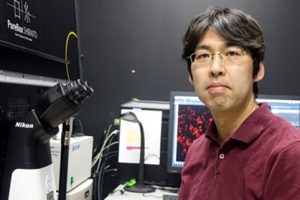| Meet the University of Wisconsin-Madison’s Aussie Suzuki Assistant Professor of Oncology School of Medicine & Public Health |
 |
Research area Focusing on kinetochore functions in faithful chromosome segregation to study how the loss of kinetochore integrity causes cancer. Studying how the Human Immunodeficiency Virus-1 protein functions in cell cycle regulations and the mechanism underlying the Epstein-Barr Virus capsid assembly.
What excites you about your work?
“My main research focus is understanding the molecular mechanism of cell division and studying kinetochore functions. We needed to see kinetochore structures under a fluorescence microscope, so we developed a new technology that improves a regular fluorescence microscope’s resolution to under 15 nanometers by expanding cells by a factor of 12 in three-dimensional space.”
What do you hope to achieve?
“Now that I’ve developed new technology that makes invisible structures visible, I want to use them to address biological questions in cell division, HIV-1 and EBV research. I also would like to continue to develop novel imaging technologies for future patents.”
Aussie developed innovative microscopy tools that he needed to answer the scientific questions that drive his research. We can now work with companies to make those tools widely available.
– Jennifer Gottwald, WARF, Director of Licensing
Want to learn more?
Jennifer Gottwald, [email protected], 608.960.9854